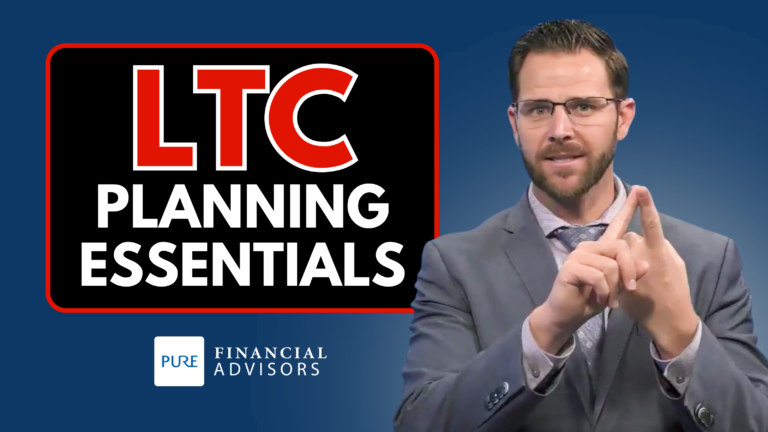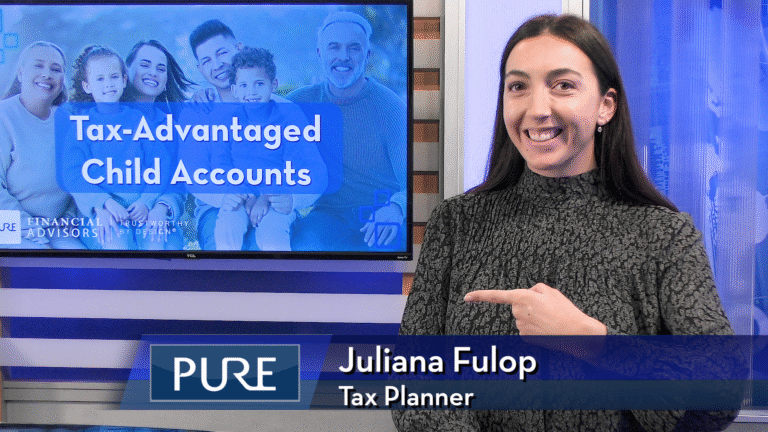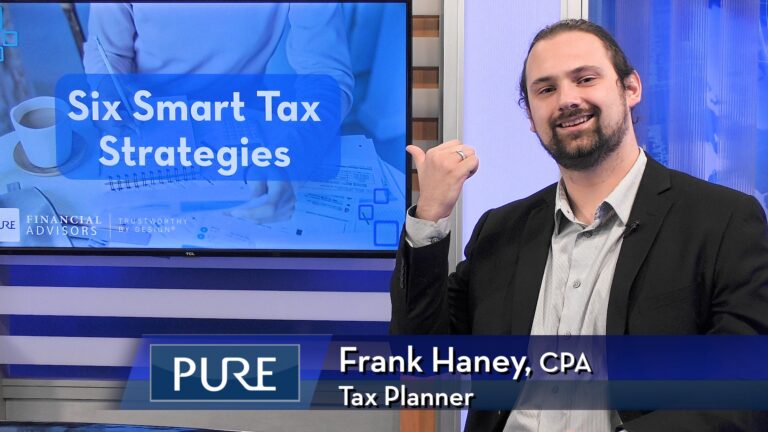It’s important to take action and get your estate plan in order. Pure’s Financial Planner, Peter Stokes, CFP®, AIF®, covers the key considerations you or your parents should discuss before deciding what legal documents to obtain:
- Document assets and approximate value
- Determine who gets assets
- Determine who will manage assets
- Determine who will be responsible for minor or dependent children
- Determine who will make decisions about medical care and finances
- Document funeral preference
FREE GUIDE | Estate Plan Organizer

Transcript
Some of these are unpleasant to think about or discuss with family members but they’re important, nonetheless. Not doing so can sometimes lead to conflict within the family. Also, it can leave your loved ones to make decisions that are very difficult to make if they aren’t clear on what your intentions were. Before considering specific legal documents, these are the key questions you or your parents should consider:
- What’re my assets and what is the approximate value?
- What people or organizations do I want to have these assets? And do I want to give them away during my lifetime or after my death?
- Who should manage these assets during my lifetime, if I become unable to do so? Or after my death, if management is needed.
- Who should be responsible for taking care for minor or dependent children, if I am unable to do so?
- Who should make decisions about my medical care and finances, if I can’t make them?
- After I die, do I want my remains donated, cremated or buried?
Once you’ve answered these questions it is usually wise to get some simple documentation in writing to provide legal assurance that those wishes will be enforced. The three main estate planning documents you’re that likely to come across are wills, trusts, and advanced directives.
A will can be used upon death to dictate several different things, including how to divide up property, guardianship, debt, and more. For some people, a will covers many estate planning needs. But in some situations, such as for those who own large properties or predict any family disputes that could impact the will, further estate planning documents, like a trust, may be necessary.
Trusts are useful for several reasons, including providing more support than wills for those with larger estates, large amounts of property, or those who expect a disability. The most notable difference between a will and trust, however, is when the documents come into effect. A will determines who will become a beneficiary after the person passes away; however, trusts take effect as soon as they’re enacted (hence the term “living trust”). It’s also worth noting that creating a trust is more complex, and more expensive, than a will.
Another reason that one may choose to have a living trust is to avoid probate court, which can be a long and costly process – especially for those with larger estates. Additionally, when a will goes into probate, it becomes a court document; a living trust, on the other hand, is not made public upon your death, so your estate can be managed in private.
Advanced directives (also called advanced healthcare directives) stipulate a person’s wishes regarding end of life care and/or what is to happen if the person becomes mentally incapacitated or unable to communicate later in life. This provides guidance for your family and medical professionals in the event you can no longer make your own health care decisions.
Now that you’ve learned all about your options, and have started thinking about how you want to handle your estate, it’s important to take action and get your estate in order today. If you need help in determining what planning is need for your estate, contact Pure today for a free financial assessment.
Subscribe to our YouTube channel.
IMPORTANT DISCLOSURES:
• Investment Advisory and Financial Planning Services are offered through Pure Financial Advisors, LLC, a Registered Investment Advisor.
• Pure Financial Advisors LLC does not offer tax or legal advice. Consult with your tax advisor or attorney regarding specific situations.
• Opinions expressed are subject to change without notice and are not intended as investment advice or to predict future performance.
• Investing involves risk including the potential loss of principal. No investment strategy can guarantee a profit or protect against loss in periods of declining values.
• All information is believed to be from reliable sources; however, we make no representation as to its completeness or accuracy.
• Intended for educational purposes only and are not intended as individualized advice or a guarantee that you will achieve a desired result. Before implementing any strategies discussed you should consult your tax and financial advisors.
CFP® – The CERTIFIED FINANCIAL PLANNER™ certification is by the Certified Financial Planner Board of Standards, Inc. To attain the right to use the CFP® designation, an individual must satisfactorily fulfill education, experience and ethics requirements as well as pass a comprehensive exam. Thirty hours of continuing education is required every two years to maintain the designation.
AIF® – Accredited Investment Fiduciary designation is administered by the Center for Fiduciary Studies fi360. To receive the AIF Designation, an individual must meet prerequisite criteria, complete a training program, and pass a comprehensive examination. Six hours of continuing education is required annually to maintain the designation.












